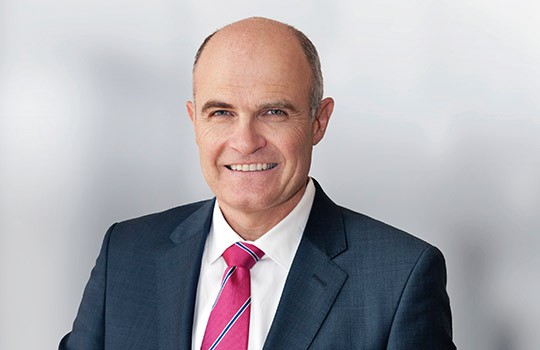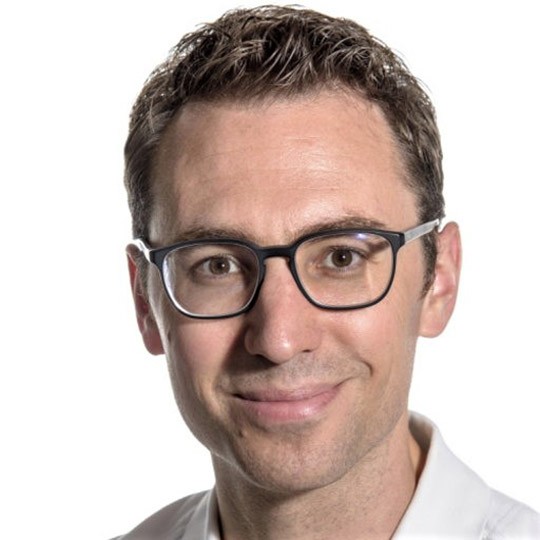Monitoring with digital personal health record
Higher quality of life, lower costs
Only a few patients already share health data electronically with their doctor. A research group directed by the Kantonsspital St. Gallen hospital is currently examining how simple and useful such an exchange can be.
Text: Roger Welti, images: Keystone, updated July 16, 2018
Brigitte Schneider finds the weather discomforting today. The woman from eastern Switzerland suffers from chronic obstructive pulmonary disease COPD – like around 400,000 other people in this country. On certain days she has difficulty breathing and physical exertion is almost impossible, Schneider explains. Medications can indeed alleviate the symptoms of COPD, however the disease itself cannot be cured. That’s why it’s so important to improve the quality of life for sufferers as much as possible – for instance, so that an acute deterioration of health does not involve a stay in hospital.
Digitalisation enables innovative approach
“I am convinced that the use of telemedicine can succeed in doing exactly that”, says Dr Frank Rassouli, senior doctor in Pneumology at Kantonsspital St. Gallen. Currently, five Swiss and one German clinic are undertaking a study with 175 participants under his direction. The electronic personal health record Evita is being used during the study for monitoring the condition of COPD patients. Brigitte Schneider is also taking part: “I didn’t have to consider whether I would take part in the study for very long. There are only benefits – for me and for other COPD patients.”
She and the other study participants answer questions about their state of health every day in the Evita record. All the information is collected in real time by the participating hospitals. If a patient shows worrying values, he or she is immediately contacted by the study team. The doctor treating them asks additional questions about their condition and gives advice over the phone. The goal: The affected patient is treated quickly and, if possible, at home. Emergency hospital stays are thus prevented – with positive effects on patients’ quality of life and the costs for society. “Every avoided emergency admission saves the healthcare sector several thousand francs”, explains Rassouli, the director of the study.
Evita: Not just for patients
The personal health record Evita is not only suitable for telemedical uses. It supports people in managing all their health information in general. Whether while travelling, during a doctor’s consultation or in an emergency: With Evita, all important medical information can be accessed online and can be shared with your relatives, friends or a doctor. Evita users personally and individually assign the corresponding access rights. All data in Evita are securely transmitted and stored in encrypted form.
Quality of life increases, costs are lowered
Initial results of the study, which will run until summer 2019, show that the use of telemedicine is promising both from a qualitative as well as a quantitative perspective. Patients who have completed both study phases feel they are getting better care with Evita than without it. With telemedicine care, a quarter of the patients improved their values in the recognized COPD Assessment Test, which assesses their state of health using a standardized questionnaire. The hospitalisation rate due to acute deterioration was a quarter lower than without monitoring. COPD-related treatment costs were 44% lower during telemedicine use than without it.
"So far, we have been able to show that we can improve the quality of life of COPD patients and reduce hospitalisation rates by using the electronic health record," says study director Dr. med. Frank Rassouli from the St. Gallen Cantonal Hospital. Each avoided emergency saves the health service several thousand francs. Prof. Dr. med. Gregor Zünd, CEO and Chairman of Hospital Management at the University Hospital Zurich, is also convinced of the path taken in the study: "We must promote digitalisation in medicine so that patients can increasingly be cared for at home."
Digitalisation increases quality and efficiency
Zünd and Rassouli believe the potential of digitalisation is far from exhausted. "Digitalisation is the key to success if we want to improve the quality of life and safety for our patients and increase the efficiency of our operations," emphasises Zünd. And Rassouli is confident that the final results of the COPD study will also confirm the potential of telemedicine monitoring. "And then an extension in the utilisation of Evita for such purposes should definitely be considered."

Prof. Dr. med. Gregor Zünd, CEO and Chairman of Hospital Management at the University Hospital Zurich
More security and knowledge
In order to ensure that the electronic personal health record is also as easy to use as possible for older COPD patients, Evita has been specifically adapted to the needs of the study and its participants. With success. “The daily use of the online questionnaire is easy and quickly becomes routine”, says Brigitte Schneider. “The close communication with the team of doctors gives me security and increases my quality of life.”
The doctors taking part are also convinced by the electronic personal health record. “Our patients value the simple and in depth contact with us via Evita”, says Frank Rassouli. He has also noticed a valuable side effect: “The daily analysis of their disease increases patients’ own expertise and knowledge about COPD.” Specialists are convinced that encouraging self-responsibility and increasing patients’ own health knowledge have a positive effect on the course of the disease.

Study director Frank Rassouli
Six clinics on board
A total of six clinics are taking part in the ground-breaking telemedicine study with COPD patients:
- Clinic for Pneumology/Sleep Medicine at Kantonsspital St. Gallen (study director)
- University Hospital of Basel
- University Hospital of Zurich
- Kantonsspital Münsterlingen
- Kantonsspital Glarus
- Fachkliniken Wangen im Allgäu
More on the topic
